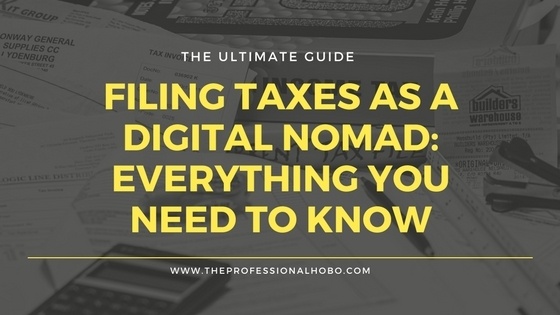
Digital Nomad Tax Guide: What You Need to Know Before Filing
Written: Vagabondist Staff| July 7, 2023
.jpg)
Determining Your Tax Residency
Understanding tax residency rules
When you work as a digital nomad, navigating the complexities of tax residency becomes crucial. Tax residency refers to the country where you are considered a resident for tax purposes. Different countries have different rules and requirements for establishing tax residency, so it is important to understand the regulations in each country you spend time in.
Factors to consider when determining tax residency status
Several factors come into play when determining your tax residency status as a digital nomad. These may include:
-
Physical presence: The number of days you spend in a particular country can impact your residency status. Some countries have specific day thresholds that determine residency.
-
Permanent home: If you have a permanent home or residence in a country, it could affect your tax residency there.
-
Center of economic and personal interests: Your business operations, personal connections, and financial ties to a country can also contribute to determining your residency.
-
Tax treaties: Tax treaties between countries may have provisions for determining residency status and avoiding double taxation.
-
Intentions and ties: Your intentions, such as where you plan to stay long-term or establish connections, and the strength of your ties to a country, can also be important factors.
Before making any decisions or claims regarding your tax residency, it is advisable to consult with a qualified tax professional who can provide specific guidance based on your unique situation. They can help you navigate the tax laws in different countries and ensure compliance with relevant regulations.

Tax Obligations for Digital Nomads
Tax obligations in your home country
When it comes to taxes, digital nomads are not exempt from their obligations in their home country. Even if you are living and working abroad, you may still be required to pay taxes on your worldwide income. It is important to understand the tax laws and regulations in your home country to ensure compliance.
In some cases, you may be eligible for certain tax benefits or deductions as a digital nomad. For example, if you maintain a residence in your home country or if you're paying taxes in another country, you may qualify for foreign tax credits or the foreign earned income exclusion. Consulting with a tax professional who specializes in international tax matters can help you navigate these complexities and maximize your tax savings.
Tax obligations in the countries you work and live in
As a digital nomad, you may find yourself working and living in multiple countries throughout the year. Each country will have its own tax laws and regulations that you must adhere to. It is important to research and understand the tax obligations in each country you visit to avoid any potential tax issues or penalties.
In some cases, you may be able to take advantage of tax treaties between your home country and the countries you visit, which can help you avoid double taxation. Additionally, some countries offer special tax incentives for remote workers or digital nomads. It is recommended to consult with a tax professional or seek guidance from the local tax authorities in each country to ensure compliance with their tax laws.
By understanding and fulfilling your tax obligations both in your home country and the countries you work and live in, you can ensure a smooth and compliant tax journey as a digital nomad.

Understanding Double Taxation
What is double taxation?
For digital nomads, double taxation refers to the situation where they are required to pay taxes on their income in both their home country and the country where they are residing and earning income. This can significantly impact their financial situation and make tax planning crucial.
Avoiding or minimizing double taxation for digital nomads
To avoid or minimize double taxation, digital nomads can take several steps:
-
Claim tax residency in a country with favorable tax laws: By establishing tax residency in a country that offers exemptions or lower tax rates for foreign income, digital nomads can reduce their tax liability.
-
Utilize tax treaties: Many countries have tax treaties in place to prevent double taxation. Digital nomads can take advantage of these treaties by claiming benefits such as tax credits or exemptions.
-
Keep track of your travel and work history: Maintaining proper records of your travel and work history is essential for proving your tax residency status and avoiding potential tax issues.
-
Consult with a tax professional: Tax laws can be complex, and the rules for digital nomads can vary from country to country. Seeking advice from a tax professional who specializes in international taxation can ensure compliance and help optimize your tax situation.
It's important for digital nomads to be proactive in understanding and managing their tax obligations to avoid any legal or financial complications. By taking these steps, they can navigate the complexities of double taxation and maintain a favorable tax position

Tax Strategies for Digital Nomads
Structuring your business to optimize tax benefits
When it comes to being a digital nomad, having the right business structure can make all the difference in optimizing your tax benefits. Here are a few strategies to consider:
-
Incorporation: Consider incorporating your business in a tax-friendly jurisdiction. This can help reduce your tax burden and provide you with access to various tax incentives and benefits.
-
Use of tax deductions: Take advantage of tax deductions available to digital nomads. These may include expenses related to travel, accommodation, equipment, and even co-working spaces. Keeping detailed records of these expenses will be crucial.
-
Seek professional advice: Consulting with a tax professional who specializes in working with digital nomads can provide valuable insights and guidance on structuring your business to maximize tax benefits.
Taking advantage of tax treaties and agreements
Digital nomads often work and travel across different countries. Understanding and leveraging tax treaties and agreements between these countries can help minimize your tax obligations. Here are a few tips:
-
Residency and tax obligations: Familiarize yourself with the tax residency rules of the countries you visit. Some countries have specific conditions that determine your tax obligations based on the length of your stay.
-
Tax treaties: Many countries have tax treaties in place to avoid double taxation. Understanding these treaties can help you take advantage of exemptions, tax credits, or reduced tax rates.
-
Consider tax-friendly countries: Research countries with favorable tax policies for digital nomads. These jurisdictions may offer special tax schemes specifically designed for remote workers.
Remember, tax laws and regulations can be complex and subject to change. It's always advisable to consult with a tax professional who is knowledgeable about digital nomad taxes and can provide tailored advice for your specific situation.

Tax Deductions for Digital Nomads
Common tax deductions for digital nomads
Digital nomads have the benefit of being able to work remotely and travel the world, but they also have the responsibility of managing their taxes. Here are some common tax deductions that digital nomads can take advantage of:
-
Home Office Expense: If you have a dedicated workspace in your home, you can deduct a portion of your rent or mortgage, utilities, and internet expenses.
-
Travel Expenses: Expenses related to business travel, such as flights, accommodation, meals, and transportation, can be deducted. Keep in mind that these expenses must be directly related to your work.
-
Equipment and Software: Deduct expenses for laptops, smartphones, cameras, and other equipment necessary for your work. You can also deduct the cost of software and subscriptions.
-
Professional Development: Expenses for courses, conferences, and workshops that enhance your skills and knowledge can be deducted.
Tips for keeping accurate records and receipts
To ensure that you can successfully claim tax deductions as a digital nomad, it's important to keep accurate records and receipts. Here are some tips:
-
Maintain a dedicated bank account: Separate your business and personal finances to make it easier to track your expenses.
-
Use online accounting tools: Utilize cloud-based accounting software or apps to track your income and expenses.
-
Keep digital copies of receipts: Take photos or scan receipts and store them electronically. This will help you stay organized and can serve as proof for deductions.
-
Consult with a tax professional: Since tax laws can be complex and vary between countries, it's advisable to seek guidance from a tax professional who specializes in digital nomad taxation.
By taking advantage of tax deductions and maintaining accurate records, digital nomads can optimize their tax situation and focus on their work and travels.

Digital Nomad Tax Tools and Resources
Online tax calculators and software
Digital nomads have unique tax considerations, as they often earn income from multiple sources and may work in different countries. To simplify the tax filing process, there are various online tax calculators and software available specifically designed for digital nomads. These tools can help you keep track of your income, expenses, and tax obligations, ensuring that you stay on top of your tax responsibilities and maximize your deductions. Some popular online tax calculators and software for digital nomads include TaxAct, TurboTax, and TaxSlayer.
Professional assistance for digital nomads
If you prefer to leave your taxes in the hands of professionals, there are specialized tax advisors and accountants who specialize in working with digital nomads. These professionals are familiar with the unique tax situations that digital nomads face and can provide tailored advice and guidance. They can help you navigate the complexities of international tax laws, ensure that you are compliant with tax regulations in different countries, and explore tax minimization strategies specific to your situation. Hiring a professional can give you peace of mind and save you time and effort in managing your taxes while you focus on your digital nomad lifestyle.
It's important to remember that tax rules and regulations can vary depending on your home country and the countries you work in as a digital nomad. It's advisable to consult with a tax professional or utilize reliable tax tools and resources to ensure accurate and compliant tax reporting.

Tax Planning Tips and Best Practices
Estimated tax payments and filing deadlines
When working as a digital nomad, it's important to stay on top of your tax obligations. Understanding the estimated tax payments and filing deadlines can help you avoid penalties and keep your finances in order. Generally, digital nomads are required to make quarterly estimated tax payments, which are due on January 15, April 15, June 15, and September 15. These payments should be based on your projected income for the year. It's advisable to consult with a tax professional or use reliable tax software to calculate the correct amounts.
Staying organized and proactive with your taxes
Being organized and proactive with your taxes is crucial for digital nomads. Here are some tips to help you stay on track:
-
Keep thorough records: Maintain a record of all your income, expenses, and receipts related to your business activities. This will make it easier to calculate your taxable income and claim deductions.
-
Separate business and personal expenses: Have separate bank accounts for your business and personal finances. This will simplify your tax preparation process and provide a clear distinction between personal and business expenses.
-
Seek professional help: Consider hiring a tax professional who specializes in working with digital nomads. They can provide expert advice and ensure that you comply with all tax regulations.
By following these tax planning tips and best practices, digital nomads can minimize their tax liabilities and ensure that their finances are in order. Remember, consulting with a tax professional is the best way to ensure compliance with the tax laws of your home country and any other relevant countries.

Introduction
For digital nomads, navigating the world of taxes can be a daunting task. With a mobile lifestyle and income derived from various sources, it's essential to have a clear understanding of how to manage your tax obligations. Luckily, there are real-life examples and valuable lessons to learn from experienced digital nomads who have successfully handled their taxes.
Examples of how digital nomads handle their taxes
-
Nomad Tax Solutions: This company specializes in providing tax guidance and support for digital nomads. They offer services such as tax consultations, tax return preparation, and ongoing tax compliance. With their expertise, digital nomads can ensure they are meeting their tax obligations while maximizing deductions and minimizing liabilities.
-
The Nomad Tax Club: This online community connects digital nomads with tax experts who understand the unique challenges they face. Members can access resources, ask questions, and learn from the experiences of others in the community. This collaborative approach helps digital nomads stay informed and make informed decisions regarding their taxes.
Lessons learned and key takeaways
-
Start early: It's crucial to educate yourself on tax regulations and requirements as soon as possible. By understanding the tax implications of your digital nomad lifestyle, you can take proactive steps to stay compliant and optimize your tax situation.
-
Seek professional advice: Working with tax experts who specialize in digital nomad taxes can provide invaluable guidance. They can help you navigate complex tax laws, identify deductions, and ensure you are maximizing your tax benefits.
-
Stay organized: Keeping detailed records of your income, expenses, and receipts is essential for accurate tax reporting. Utilizing digital tools and apps can streamline this process and help you stay organized throughout the year.
Navigating the world of taxes as a digital nomad can seem overwhelming, but learning from real-life examples and seeking professional advice can help you manage your tax obligations effectively.

Conclusion
In conclusion, navigating taxes as a digital nomad can be complex and overwhelming. However, with proper knowledge and planning, you can ensure compliance and optimize your tax situation. Here are some key points to remember:
Key points to remember when navigating taxes as a digital nomad
-
Understand your tax residency: Determine your tax residency status in each country you visit or work from to determine your tax obligations and potential benefits.
-
Keep thorough records: Maintain detailed records of your income, expenses, and any relevant documentation to support your tax filing.
-
Take advantage of tax deductions and credits: Familiarize yourself with the tax laws and regulations in your home country and the countries you work from, and identify any deductions or credits that may apply to your situation.
Final thoughts and advice for digital nomads on tax matters
It is crucial to consult with a tax professional who understands the unique challenges and opportunities faced by digital nomads. They can provide tailored advice and help you navigate the complexities of international tax laws.
Remember to stay informed about changes in tax regulations and seek updates regularly. By staying proactive and well-informed, you can effectively manage your tax obligations while enjoying the freedom and flexibility of the digital nomad lifestyle.



